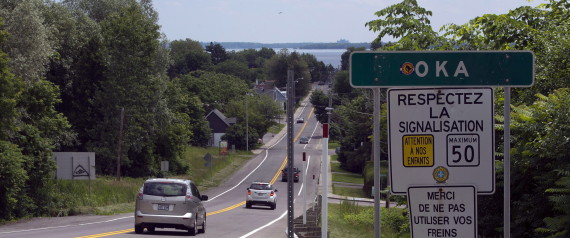The town of Oka's municipal council adopted a resolution Monday night opposing the Energy East pipeline project.
Residents are concerned the pipeline could contaminate Lake of Two Mountains.
"The water [safety] issue was too high for Oka City," said resident Simon Dubois. "Considering that we're drinking our water, or partly from, Lake of Two Mountains."
Oka is the latest in a growing list of Quebec towns and municipalities officially opposing the $12-million pipeline project.
Last week, Laval Mayor Marc Demers said he strongly opposes the project citing an "unreasonable safety risk" to the city's waterways, drinking water, agricultural land and residential neighbourhoods.
The proposed 4,600-kilometre pipeline would carry 1.1 million barrels a day of oilsands crude from western Canada to refineries in Quebec and New Brunswick.
In April, TransCanada Corp. announced it was dropping plans to build a shipping terminal in Cacouna, Que., following a government recommendation to recognize beluga whales as an endangered species (the waters off of Cacouna are home to a beluga estuary). The company said the move showed that TransCanada is listening to environmental concerns and is willing to adapt.
Benefit to Quebec?
In June,Quebec Premier Philippe Couillard said he doesn't see much economic value for the province if Quebec is simply a "transit place" for the proposed Energy East project.
The exact route through greater Montreal is unknown, but it would cross parts of Montreal, Laval and the suburbs stretching from L'Assomption to Rigaud.
Montreal Mayor Denis Coderre has expressed doubts about pipelines in the Montreal area.
The Montreal Metropolitan Community has organized several public consultations on the island and in surrounding cities on the pipeline in the coming. The first one takes place Tuesday night at Complexe Volta in Boucherville.
The MMC will then deliver a report to the province's environment assessment agency and the National Energy Board.
After 15 months of consultations with people in communities along the route of the pipeline in Ontario, the Ontario Energy Board said the environmental risks of the $12 billion Energy East pipeline project outweigh the
potential benefits, and warned it will drive up natural gas prices.
Last January, Quebec's energy regulator came out in favour of the pipeline, calling the plan "desirable."
Original Article
Source: huffingtonpost.ca/
Author: cbc
Residents are concerned the pipeline could contaminate Lake of Two Mountains.
"The water [safety] issue was too high for Oka City," said resident Simon Dubois. "Considering that we're drinking our water, or partly from, Lake of Two Mountains."
Oka is the latest in a growing list of Quebec towns and municipalities officially opposing the $12-million pipeline project.
Last week, Laval Mayor Marc Demers said he strongly opposes the project citing an "unreasonable safety risk" to the city's waterways, drinking water, agricultural land and residential neighbourhoods.
The proposed 4,600-kilometre pipeline would carry 1.1 million barrels a day of oilsands crude from western Canada to refineries in Quebec and New Brunswick.
In April, TransCanada Corp. announced it was dropping plans to build a shipping terminal in Cacouna, Que., following a government recommendation to recognize beluga whales as an endangered species (the waters off of Cacouna are home to a beluga estuary). The company said the move showed that TransCanada is listening to environmental concerns and is willing to adapt.
Benefit to Quebec?
In June,Quebec Premier Philippe Couillard said he doesn't see much economic value for the province if Quebec is simply a "transit place" for the proposed Energy East project.
The exact route through greater Montreal is unknown, but it would cross parts of Montreal, Laval and the suburbs stretching from L'Assomption to Rigaud.
Montreal Mayor Denis Coderre has expressed doubts about pipelines in the Montreal area.
The Montreal Metropolitan Community has organized several public consultations on the island and in surrounding cities on the pipeline in the coming. The first one takes place Tuesday night at Complexe Volta in Boucherville.
The MMC will then deliver a report to the province's environment assessment agency and the National Energy Board.
After 15 months of consultations with people in communities along the route of the pipeline in Ontario, the Ontario Energy Board said the environmental risks of the $12 billion Energy East pipeline project outweigh the
potential benefits, and warned it will drive up natural gas prices.
Last January, Quebec's energy regulator came out in favour of the pipeline, calling the plan "desirable."
Original Article
Source: huffingtonpost.ca/
Author: cbc

No comments:
Post a Comment